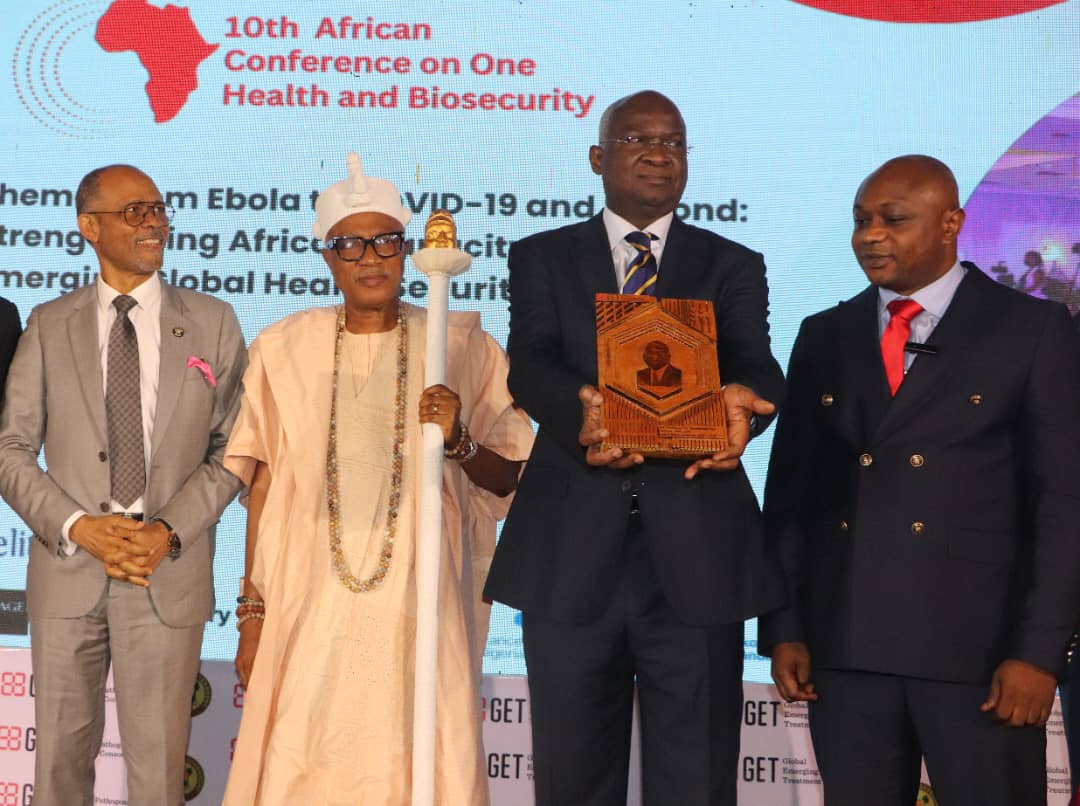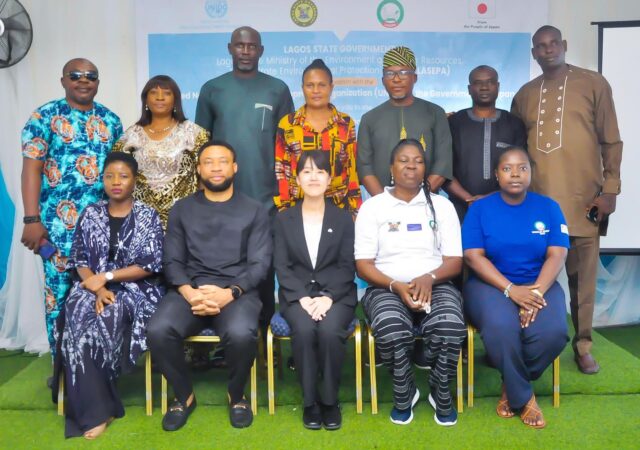- Fashola, Abayomi Unveil Strategic Plans to Address Health System Gaps
On the second day of the 10th African Conference on One Health and Biosecurity, prominent figures, including former Lagos State Governor Babatunde Fashola, Health Commissioner Professor Akin Abayomi, and GET Consortium Chief Operating Officer Dr. Ayodotun Bobadoye, emphasized the urgent need to strengthen Africa’s health systems. Focusing on biosecurity and emerging disease threats, the leaders called for immediate public awareness initiatives and robust structural reforms across Lagos and the continent.
Speaking to a packed audience at the Oriental Hotel in Lekki, Lagos, Mr. Fashola highlighted the lessons from Lagos State’s response to the Ebola outbreak. “The emergence of Ebola in an urban environment was unprecedented,” he noted, stressing that pandemics are an ongoing reality. “Antimicrobial resistance is a growing threat, with antibiotics losing their effectiveness. This is a matter of pressing concern, with real and immediate consequences,” he warned.
Fashola also advocated for greater public understanding of biosecurity. “Healthcare is more than doctors and hospital beds—it encompasses pharmacology, sanitation, and infrastructure,” he said. He urged strict enforcement of sanitation regulations, noting that issues like open defecation pose significant public health risks. He called for investments in educational tools, such as documentaries, to inform the public about biosecurity challenges. “Storytelling can play a pivotal role in building understanding. A documentary on Lagos’ battle against Ebola and COVID-19 could inspire and inform future generations,” he suggested.
Professor Abayomi outlined Lagos State’s ongoing health initiatives under the Lagos Development Plan 2052. “We aim to scale up healthcare personnel training, increasing annual admissions from 100 to 1,000,” he said. The plan also focuses on public-private partnerships to bolster primary healthcare delivery. “The private sector’s involvement is essential to meet Lagos’ healthcare needs,” he emphasized, advocating for local investments to reduce medical tourism.
Providing a comprehensive overview of the state’s healthcare resources, Abayomi highlighted the 1,800 private facilities, 31 secondary public hospitals, five tertiary institutions, and 326 primary healthcare centers currently serving Lagos’ population. “With over 12.5 million people accessing care in Lagos each year, we face significant bed shortages. A combined public and private approach is necessary to address this gap,” he stated. He also called attention to the $1.5 billion Nigerians spend on overseas medical treatment, noting that Lagos’ healthcare advancements aim to reverse this trend and make the city a leading healthcare hub in Africa.
Dr. Ayodotun Bobadoye of GET Consortium spoke on the Lagos State Biosecurity Policy, designed to protect human, animal, and environmental health. “Biosecurity encompasses risks to human, animal, and plant life, and laboratory security is increasingly important as global threats evolve,” Bobadoye explained. Highlighting the unique challenges of Lagos’ high population density and urban conditions, he said, “Lagos faces distinct risks, from waterborne diseases to infectious pathogens that thrive in densely populated areas.”
Bobadoye cited a recent WHO Joint External Evaluation, which rated Lagos’ biosecurity preparedness at 36%. “While Lagos is a national leader, this falls short of global standards. Adequate budgeting and cross-sectoral coordination are critical for epidemic preparedness,” he emphasized, advocating for collaboration between sectors like agriculture, health, and environment.
Outlining GET’s objectives for the new biosecurity policy, set for early next year, he said, “This policy will provide guidelines to manage biosecurity risks, prevent pathogen misuse, and foster collaboration.” He emphasized the need to strengthen laboratory capabilities and support both veterinary and public health sectors.
As the conference concluded, speakers underscored the importance of a unified approach to biosecurity, embracing the One Health model that connects human, animal, and environmental health. Fashola closed with a call for collective action: “Our resilience in health security hinges on our shared commitment to preparedness and proactive measures.”








Saved as a favorite, I really like your blog.
I couldn’t refrain from commenting. Well written!
Confused about how to proceed with recovery of your QIWIwallet funds? Our support team are ready to help to guide you through the processand answer any queries you have.Choosing our company, you’re opting for a dependable partner in getting your money back.
This piece of writing will help the internet people for creating new webpage or even a weblog from start toend.
2j7UNpa0IRlwuy0oBNUDrjyMTgc
I don’t think the title of your article matches the content lol. Just kidding, mainly because I had some doubts after reading the article.
What’s Going down i’m new to this, I stumbled upon this I have discovered It absolutely useful and it has aided me out loads. I hope to give a contribution & help other users like its aided me. Great job.
I haven¦t checked in here for a while because I thought it was getting boring, but the last few posts are good quality so I guess I will add you back to my daily bloglist. You deserve it my friend 🙂
I carry on listening to the news broadcast talk about getting free online grant applications so I have been looking around for the best site to get one. Could you tell me please, where could i get some?
I’m truly enjoying the design and layout of your site. It’s a very easy on the eyes which makes it much more enjoyable for me to come here and visit more often. Did you hire out a developer to create your theme? Outstanding work!
The web marketplace for the sale of toys is at the moment booming pushed largely by nostalgia and a desire by individuals to recapture their youth.
I always spent my half an hour to read this weblog’s articles or reviews daily along with a mug of coffee.
Line 10 is a secondary line on the Parisian community, and the number of total passengers quantities to solely a bit more than a quarter of the overall passengers of line 1. Line 10 is the least-traveled line on the network, with the exception of the brief 3bis and 7bis lines.
information.|My family members every time say that I am killing my time here
I don’t think the title of your article matches the content lol. Just kidding, mainly because I had some doubts after reading the article.
Hello great website! Does running a blog similar to this require a lot of work?I have very little knowledge of coding however I was hoping to start my own blog in the near future.Anyways, if you have any ideas or tips for new blog owners please share.I know this is off subject however I just needed to ask.Appreciate it!
Appreciate this post. Will try it out.
Very interesting info !Perfect just what I was looking for!
The root of your writing while sounding agreeable at first, did not work perfectly with me after some time. Somewhere throughout the sentences you actually managed to make me a believer unfortunately just for a short while. I nevertheless have a problem with your jumps in logic and you would do nicely to fill in those gaps. In the event that you actually can accomplish that, I could certainly end up being impressed.
Its superb as your other posts : D, appreciate it for posting.
certainly like your web-site however you need to test the spelling on quite a few of your posts. Many of them are rife with spelling problems and I to find it very bothersome to inform the truth on the other hand I’ll definitely come back again.
Outstanding post, you have pointed out some great points, I too believe this s a very wonderful website.
Excellent website. A lot of useful information here. I’m sending it to several friends ans also sharing in delicious. And certainly, thanks for your effort!
Wonderful goods from you, man. I’ve understand your stuff previous to and you are just too excellent. I really like what you’ve acquired here, certainly like what you’re saying and the way in which you say it. You make it entertaining and you still take care of to keep it smart. I can not wait to read far more from you. This is really a tremendous web site.
Hi, Neat post. There’s a problem along with your web site in internet explorer, may check thisK IE nonetheless is the marketplace leader and a large component of other people will leave out your wonderful writing due to this problem.
Precisely what I was looking for, thanks for posting.
Perfectly indited subject matter, Really enjoyed studying.
Thank you for the sensible critique. Me and my neighbor were just preparing to do some research about this. We got a grab a book from our local library but I think I learned more from this post. I am very glad to see such fantastic info being shared freely out there.
Excellent post. I was checking constantly this blog and I am inspired! Very helpful info specially the last part 🙂 I maintain such info much. I used to be seeking this particular info for a very long time. Thank you and good luck.
Great wordpress blog here.. It’s hard to find quality writing like yours these days. I really appreciate people like you! take care
I like this weblog so much, saved to fav.
Just desire to say your article is as astounding. The clarity on your post is just nice and that i could assume you are a professional on this subject. Well together with your permission let me to grab your feed to keep updated with approaching post. Thanks a million and please keep up the enjoyable work.
My brother suggested I might like this website. He was totally right. This post actually made my day. You can not imagine just how much time I had spent for this information! Thanks!
wonderful points altogether, you simply gained a brand new reader. What would you recommend in regards to your post that you made a few days ago? Any positive?
Absolutely indited content material, thank you for entropy. “In the fight between you and the world, back the world.” by Frank Zappa.